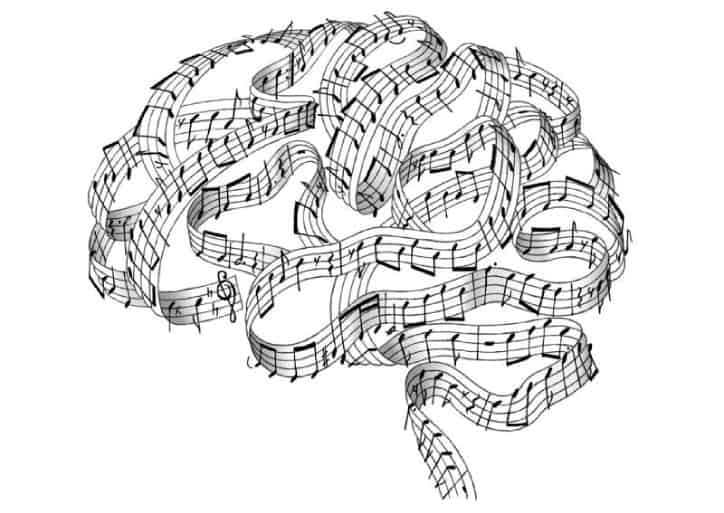
Music and the Brain
Music & Memory started with the understanding that music is deeply rooted in our conscious and unconscious brains. As powerful as that idea is, it becomes even more important if the functioning of the brain is deteriorating, as it occurs in Alzheimer’s disease and dementia, and other types of cognitive loss. But music can awaken the brain and with it, the rich trove of memories that are associated with familiar songs or beloved pieces.
Help Music & Memory bring the joy of personalized music to more individuals living with Alzheimer's and dementia, and other types of cognitive loss.
Oliver Sacks on Music, Memory and Emotion
Oliver Sacks, M.D., noted neurologist and best-selling author of Musicophilia, discusses the impact of personalized music on people suffering from Alzheimer’s and severe memory loss.
Dr. Sacks died on August 30, 2015. He was a wonderful friend to Music & Memory who made important contributions to the conversation around Alzheimer’s and other forms of dementia through a lifetime of work and research. Rest in peace.
"The past which is not recoverable in any other way is embedded, as if in amber, in the music, and people can regain a sense of identity. . . " — Oliver Sacks
Featured Research

The Impact of Music & Memory on Resident Level Outcomes in California Nursing Homes
In 2020, researchers from the Betty Irene Moore School of Nursing at UC Davis completed the most comprehensive study of its kind on the effects of the Music & Memory program, which found that personalized music is associated with a reduction in the amount of antipsychotic medication taken by nursing home residents and fewer distressed behaviors. The three-year study of 4,107 residents in 265 California nursing homes found the use of antipsychotic drugs declined by 13% and anti-anxiety medications declined by 17% each quarter for residents with dementia using the music program. The odds of depressive symptoms decreased 16% per quarter and the odds of reported pain decreased 17% per quarter. In addition, the number of days on medications declined by 30% and aggressive behaviors reduced by 20%. The results are published in the Journal for Post-acute and Long-term Care Medicine (JAMDA).

Music Activates Regions of the Brain Spared by Alzheimer’s
An April 2018 study reports that “objective evidence from brain imaging shows personally meaningful music is an alternative route for communicating with patients who have Alzheimer’s disease.” The research, published by a team at University of Utah Health in Salt Lake City in The Journal of Prevention of Alzheimer’s Disease, demonstrates that familiar music may facilitate attention, reward and motivation, which in turn makes it more possible to manage emotional distress in Alzheimer’s. While the study’s small sample size and single imaging sessions leave room for more research to be done, the findings mark a significant step toward demonstrating how Music & Memory’s personalized music program is a therapeutic mechanism to address measurable improvement in mood, awareness and quality of life for people with dementia. Read more.

Music & Memory and Improved Swallowing in Patients with Advanced Dementia
Swallowing, self-feeding and choking issues affect many people with advanced dementia, leading to serious health consequences such as dehydration, malnutrition and weight loss (change of status). This 2018 study, published in conjunction with Dr. Stephen Post of Stony Brook University in Dementia: The International Journal of Social Research and Practice presents data indicating Music & Memory’s personal music intervention improves swallowing in individuals with advanced dementia, making eating easier and potentially diminishing reliance on feeding tubes and PEG intervention. This is a significant finding at a pilot level and is strong enough to warrant further replication. Read more.

An Individualized Music-Based Intervention for Acute Neuropsychiatric Symptoms in Adults with Cognitive Impairment
Neuropsychiatric symptoms are common features of dementia, and these occur in three fourths of patients on psychogeriatric inpatient units. These symptoms have traditionally been treated with pharmacological agents, but many medications are as likely to harm patients with dementia as to help them. As a result, nonpharmacological interventions are increasingly being investigated as ways to reduce these symptoms. This 2018 study, published by the University of Kansas School of Medicine, concludes that agitation, negative mood, and positive mood all benefited from the music-based intervention, with resulting large effect sizes. Read more.

Music Intervention to Prevent Delirium Among Older Patients Admitted to a Trauma Intensive Care Unit and a Trauma Orthopedic Unit
Delirium onset as a result of hospitalization poses a serious health risk to older patients. In a randomized, controlled study of 40 patients aged 55 and older, Dr. Kari Johnson, PhD, RN, ACS-BC with Honor Health in Scottsdale, Arizona, tested the effect of pre-recorded self-selected music playlists on trauma patients’ vital signs and assessed confusion. In the music intervention group, there was a statistically significant reduction in heart rate and systolic blood pressure, versus no change for the control group, indicating that the intervention had helped to reduce patient anxiety—a major precursor to onset of delirium. The study was published in the August 2018 issue of Intensive and Critical Care Nursing. Read more

Individualized Music Program is Associated with Improved Outcomes for U.S. Nursing Home Residents with Dementia
A 2017 study by Brown University, published in The American Journal of Geriatric Psychiatry, compares behavioral and psychological resident outcomes before and after implementation of the Music & Memory program. Ninety-eight nursing homes trained in Music & Memory were studied along with 98 matched-pair comparisons for the year 2012-2013. The results show that discontinuation of antipsychotic medications increased in Music & Memory facilities (23.5% to 24.4%), while decreasing among comparison facilities (24.8% to 20.0%). Facilities using Music & Memory also demonstrated increased rates of reduction in behavioral problems (50.9% to 56.5%) versus comparison facilities (55.8% to 55.9%). Implication for practice concluded that “effective, non-medicalized, low-cost interventions such as Music & Memory, are critical to address the needs of the growing ADRD population.” Read more.

Music and Memory in Dementia Care
A 2017 study in the International Journal of Neurorehabilitation led by Deepa Vinoo at New York City Health + Hospitals examined the impact of personal music on 108 residents of four Memory Care units at an 815-bed long-term nursing care facility. All residents of the four units were assessed over a two-year period for use of Music & Memory, antipsychotic usage, physical altercations and falls. The Music & Memory program was part of a mix of improvements in memory care at the facility. At the end of the study period, there was a significant reduction in the transfer of residents to psychiatric ERs for behavioral and psychological symptoms of dementia (BPSD), as well as a significant reduction in falls and physical altercations and resulting drop in transfers to acute hospitals for further management. One-to-one observations decreased from five to one during the same period. Read more.

Repeated Exposure to Familiar Music Alters Functional Connectivity in Alzheimer’s Disease
Alzheimer’s Disease is characterized by the disruption of resting-state networks, particularly decreased functional connectivity within the Default Mode Network (DMN) of the brain. Neuroimaging studies in healthy controls suggest music exposure elicits functional connectivity changes in areas involved in cognition, including the DMN. A July 2018 study published in Alzheimer’s & Dementia used neuroimaging to determine whether daily exposure to long-known music can alter functional brain connectivity (FC) and improve cognitive outcomes in persons with mild cognitive impairment and early Alzheimer’s. A research team led by Melissa Leggieri found whole-brain significant differences in FC for subjects who had participated in a three-week, home-based music intervention program. Read more.
Research by Topic
(Compiled by Nina S. Parikh, PhD, MPH, Brookdale Center for Healthy Aging of Hunter College, CUNY)
Free Guides
Visit our Get Involved page to learn more about the use of these guides. If you have questions, please contact us via email, info@musicandmemory.org
How to Make a Personalized Music Playlist for a Loved One at Home
Is there someone in your care that would benefit from the power of personalized music? We recommend creating a 20-30 song playlist from their youth and offering it for 30 minutes at a time as often as is needed or enjoyed. To ensure it’s highly personalized for greatest impact, try to find top songs from when they were 15-25 years old. We also suggest offering it proactively before medical appointments or social occasions.
For more detailed guidance, please refer to our free guide: How to Make a Personalized Playlist for a Loved One at Home. Feel free to contact us if you have any questions.
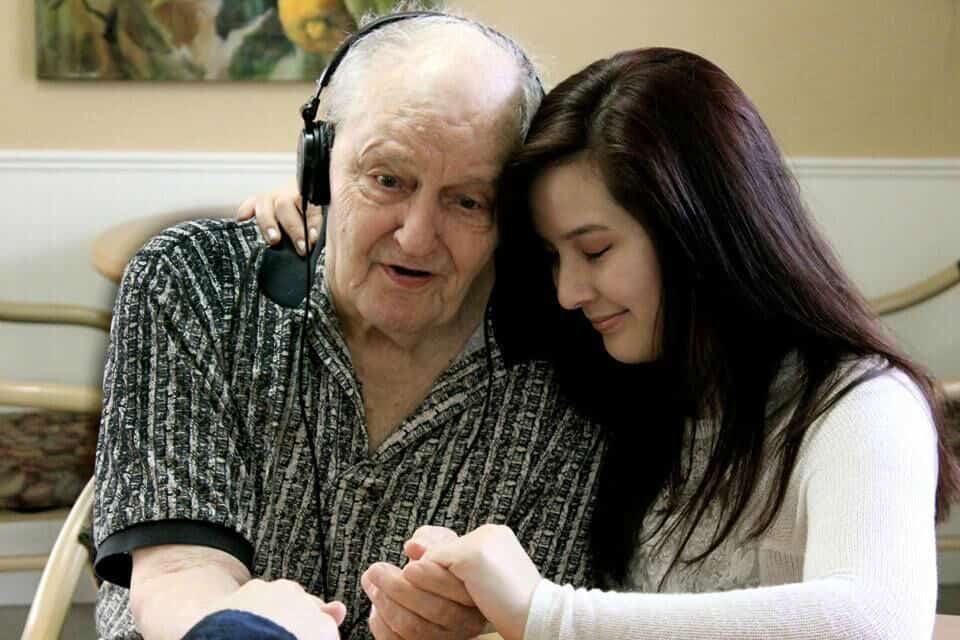
Footer
About MUSIC & MEMORY®
MUSIC & MEMORY® is a non-profit organization that helps individuals with a wide range of cognitive and physical conditions to engage with the world, ease pain, and reclaim their humanity through the use of personalized music.
By providing access and education, and by creating a network of Music & Memory certified organizations, we aim to make the therapeutic use of personalized music a standard of care throughout the health care industry.
Accountability
We are committed to financial accountability and transparency. Music & Memory has received silver level status at GuideStar. We’re also honored to be part of the Combined Federal Campaign #90590.


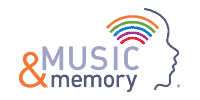
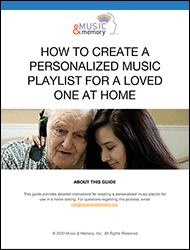
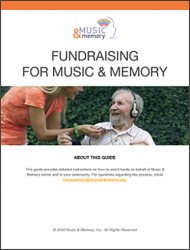
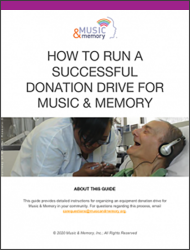

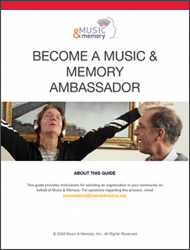
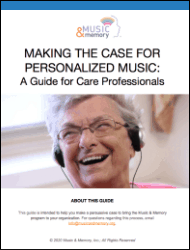

No comments:
Post a Comment